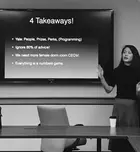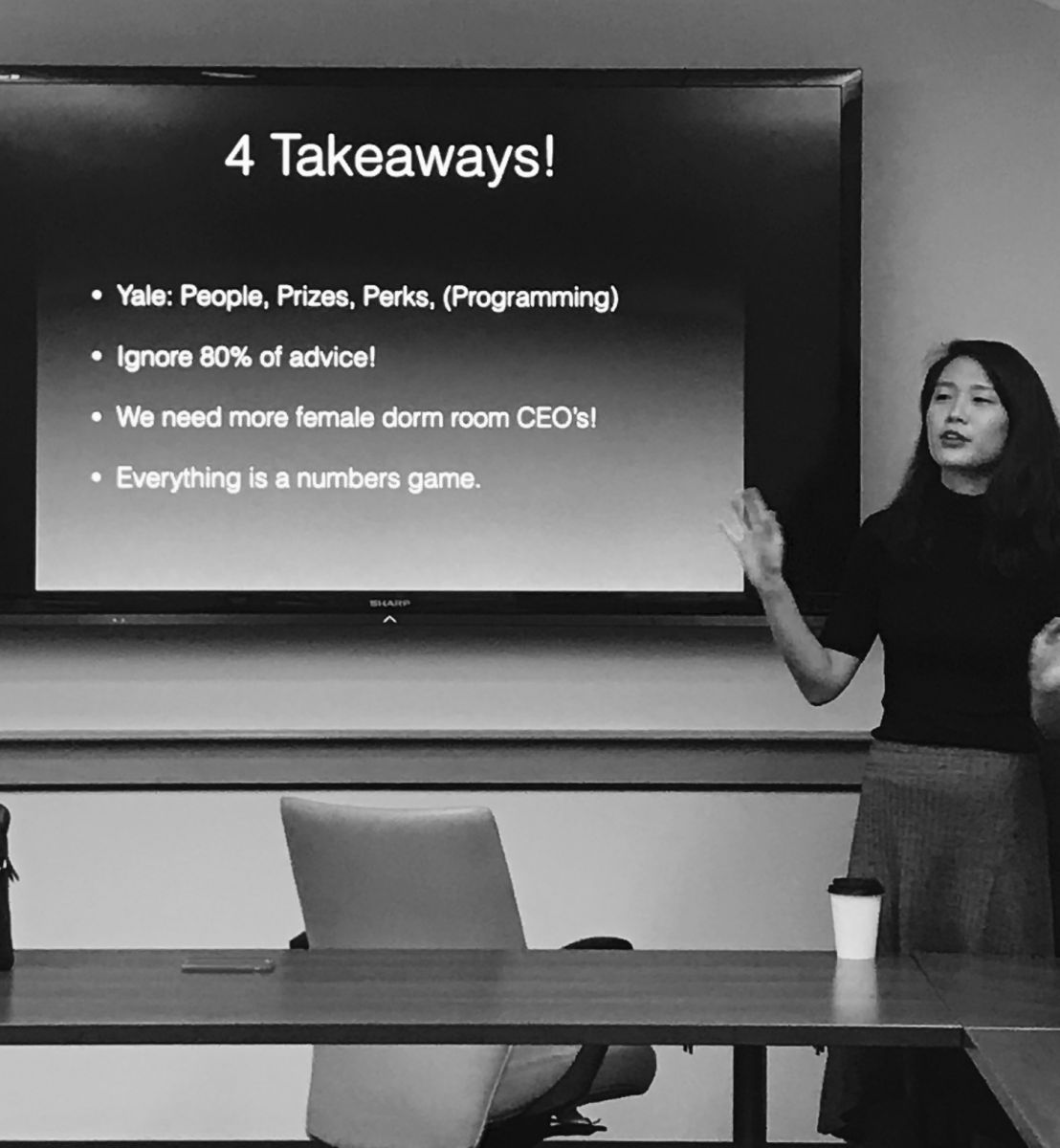
Women's Innovator Breakfast: April Koh of Spring Health
Spring Health’s mission is to help individuals and organizations flourish by eliminating every barrier to mental health.
April Koh (Yale College ’16) is the founder and CEO of Spring Health, an AI-enabled mental health service that partners with employers to deliver high-quality, convenient mental health care to their employees. April has received honors from the American Psychiatric Association and was named to the Forbes 30 Under 30 list in 2018. Today at her talk — co-sponsored by InnovateHealth Yale — she shared the beginnings of her entrepreneurial journey at Yale, and how technological innovations are advancing modern healthcare.

Spring Health’s mission is to help individuals and organizations flourish by eliminating every barrier to mental health. “We combine leading technology with the best mental health professionals to help people feel better, faster,” said Koh, adding that the company has raised $8 million to date, employs around 20 people in its New York office, and counts Whole Foods, Gap and Warby Parker as clients.
Koh’s interest in entrepreneurship was sparked at a Yale coding bootcamp run alongside the former Yale Entrepreneurial Institute. “At the bootcamp, many entrepreneurs shared their stories and I realized how entrepreneurial-focused it was,” she said. “I fell in love with the world of startups; it seemed to suit me and felt so “me.” If there is one thing that is consistent in my life, it is that I make key decisions out of the desire to be different.”
For Koh, owning her own company meant having the authority, ownership and leadership to realize what she wanted to create. At the bootcamp she met her co-founders for her first startup endeavor, Spylight, for which she was the Chief Product Officer and co-founder. The app was created to help people shop what they saw in TV and in movies directly from their phones, functioning as a sort of “Shazam-style” plug-in for visual media. Koh said the company raised $5 million, and she took a leave of absence from Yale during her junior year. “I felt like I’d found my calling, and spent two years in L.A. growing the company,” she said.
After a while, Koh had a change of heart and re-evaluated the impact of her work. “Your 20s and 30s are the most energetic and free you’ll ever be, so I thought, why not spend those decades doing something I think is super impactful?” She added that she didn’t want to spend her 20s just helping people shop for clothes. She made the difficult decision to leave the company and joined Shazam’s product team for a few months before returning to Yale.
Koh’s interest in mental health stemmed from her time at Yale: her roommate went through seven different antidepressants, and Koh described the mental healthcare system as “broken,” with up to 21-day wait times and messy scheduling systems. “I constantly thought about ways to improve it,” she said. “I read papers published by Yale Psychiatry, and came across a paper that described a machine learning model that outperformed psychiatrists in mental health treatments.” Psychiatrists typically use a trial and error process to treat patients, which Koh describes as a sort of “guessing game.” She connected with one of the lead authors of the paper, and was able to put together a minimum viable product of a quick questionnaire by putting the researchers’ algorithm online. “The more I played around with it, the more I wanted to pursue it,” she said, after enlisting a friend from the Computer Science department to form a team with her and the PhD researcher she’d reached out to. “I randomly started applying to all these prizes with the product I had built, such as the Thorne Prize and other SOM prizes.”
Spring Health received approximately $100,000 in non-dilutive capital, and Koh highlighted the learning experience of preparing for pitches and articulating Spring Health’s value proposition to prize judges and investors alike. “It gave us a chance to work towards a concrete goal, and showed that we worked really well together,” she said, adding that she really didn’t know much about healthcare back then but learned along the way. “Winning the prizes early on was great validation for us, and motivated us to keep pursuing our idea.”
Spring Health raised a $2 million seed round, with a large proportion of participation from people in the Yale network. Kevin Ryan, a prominent Yale alumnus, investor and serial entrepreneur was one of the first major investors in the company. Just four months ago Spring Health closed a $6 million Series A round, and is now building out its team.
Koh is extremely proud of the significant impact Spring Health makes on the culture of the companies they work with. “When the CEO sends an email to the whole company telling the employees that the company has purchased Spring Health and are prioritizing the mental health of its employees, that makes a difference,” she said. 1 out of 3 employees of Spring Health’s corporate customers sign up for Spring Health, which Koh described as a “testament to how convenient the product is, and also indicative of the great demand for better mental health support in the workplace.”
Spring Health’s 4-minute confidential quiz identifies a variety of mental health problems beyond just anxiety and depression, and develops a wellness plan tailored to each person. “We know that everyone responds to different things, so we try to tailor our plans to each person,” said Koh. Examples of plans include seeing a therapist who specializes in certain modalities of psychotherapy, self-help resources, and so on. Spring Health has its own proprietary premium network, and teaches its members Spring protocols to treat patients. Spring Health boasts an average wait time of 1.7 days, compared to the average 21 day wait to visit mental health professionals outside the network.
The breakfast series concluded with Koh’s 4 key takeaways.
Firstly, she encouraged attendees to take advantage of Yale’s resources: its people, prizes, perks and programming. “Yale was critical to my entrepreneurial journey,” she shared, lauding the wealth of opportunities available to Yale community members to advance their ideas.
Secondly, ignoring 80% of the advice she received was the best thing Koh did for Spring Health. Many professors with more intellectual viewpoints rather than business-savvy approaches told her to abandon the idea — or worse, to let them launch the company instead!
Thirdly, Koh said the world needs more female dorm-room CEOs. “People judge women on experience and men on potential,” she said. “I was the most unqualified person to start spring but I learned quickly and was hungry for knowledge. That chip on my shoulder was what led me to succeed early on.”
Finally, everything is a numbers game. This is something Koh said she learned too late in her business. “I’d get rejections from 3 people, and I’d think I failed, but 3 rejections is not failure,” she said. “You have to build a pipeline and try your idea on a big sample size to really know if you succeeded or failed. I pitched 110 investors and it only took 1 investor to get that money. I made sure my pipeline was huge.”
Veena McCoole is a senior English major at Yale who enjoys horse riding, traveling and eating croissants. Originally from Singapore, she loves hearing from entrepreneurs with game-changing ideas and companies, and is partial to the fashion-tech and wellness sector.



